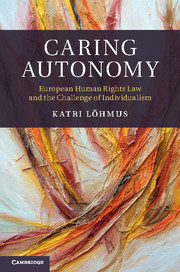Description
Caring Autonomy
European Human Rights Law and the Challenge of Individualism
Author: Lõhmus Katri
Argues that European human rights law must acknowledge that autonomy is dependent on the existence of trusting and caring relationships.
Language: English
Subject for Caring Autonomy:
Approximative price 111.58 €
In Print (Delivery period: 14 days).
Add to cart
Publication date: 04-2015
260 p. · 15.2x22.9 cm · Hardback
260 p. · 15.2x22.9 cm · Hardback
Description
/li>Contents
/li>Biography
/li>
Despite its absence in the written text of the European Convention on Human Rights, the European Court of Human Rights now regularly uses the concept of autonomy when deciding cases concerning assisted dying, sexuality and reproductive rights, self-determination, fulfilment of choices and control over body and mind. But is the concept of autonomy as expressed in the ECtHR reasoning an appropriate tool for regulating reproduction or medical practice? Caring Autonomy reveals and evaluates the type of individual the ECtHR expresses and shapes through its autonomy-based case law. It claims that from a social and ethical perspective, the current individualistic interpretation of the concept of autonomy is inadequate, and proposes a new reading of the concept that is rooted in the acknowledgment and appreciation of human interdependence and the importance of interpersonal trust and care.
Introduction; 1. Choosing autonomy; 2. What informs the ECtHR? The origins of the concept of individual autonomy; 3. Expressions of individual autonomy; 4. Autonomy, individualisation and the emergence of the problem of trust; 5. Autonomy, law and trust; 6. Caring autonomy; Conclusion.
Katri Lõhmus recently obtained her PhD in law from the University of Edinburgh. She was previously a legal counsel in the Constitutional Review Chamber of the Supreme Court of Estonia.
© 2024 LAVOISIER S.A.S.




